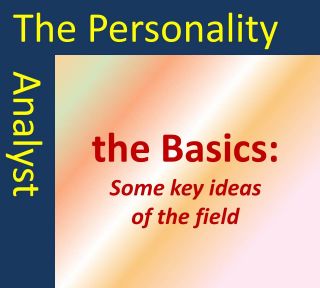Personality
The Allure of Our Private Personality
Our inner feelings and imagination and where they lead
Posted January 21, 2014

Some key ideas from the field of personality psychology
One of the most exciting aspects of studying personality is the opportunity to delve within our private selves—behind the surface of what is readily perceived about us, to our inner psychological lives including our unconscious and semi-conscious qualities, imaginings, goals, and spirituality. When we turn our attention inward, we become attuned to a realm of private processes that only we can directly witness: our needs, wants and intuitions, as well as our feelings about them all. We remember our selves as we have been in the past and imagine who we may become in the future.
If we draw near to our most private thoughts and desires, we may be better able to choose what to do in our daily lives. The needs, yearnings and feelings we experience reflect the wellsprings of psychological energy within us--the natural direction of our thoughts and emotional reactions apart from the social pressures that arise outside of us, pressures that are embodied by authority figures and society. Reflecting on our inner self, we may imagine snippets of actions we could engage in to fulfill our true wants and feelings, and may thread them together as plans—plans that may seem fantastical at first, but that could be tailored to conform to the realities of our lives. These plans have the potential to provide us with energy throughout the day because few things are as motivating to us as fulfilling our own authentic wants and desires. Engaging in this process reflects what I have referred to as personal intelligence—an ability to reason about personality and personality-related information.
We may be surprised: The more we explore these innermost parts of ourselves, the more we discover that our inner sources of energy have an unexpected social dimension to them. If we discover within us a need for power, it is for power in relation to the other people around us; if we discover an inner sadness, the sadness often relates to the loss of a person, pet or hope in our lives. In short, there is a paradox: however autonomous, independent, and individualistic our innermost self is, it is saturated with social connections. We internalize social standards, reflect on how others perceive us and how we wished to be perceived. And, indeed, we cannot understand our innermost feelings and thoughts without an understanding of the social world in which we operate. These internalized standards provide a kind of safety net that ensures the journey within leads outward again in ways that are helpful to others. It is why using our personal intelligence potentially helps others as much as it helps ourselves.
If the discovery of social elements in our innermost selves isn't enough to convince us of the surprisingly social nature of personality, there is a second revelation that comes from further study in the field. As scientists, when we describe an individual’s personality in a given fashion, we want evidence that our description is accurate. The person we describe may provide one particularly valid source of information as to our description—she may describe herself as outgoing, relaxed, and athletic. But as "third-parties" interested in her personality, we are likely to weigh equally the observations of the people around her: that she is indeed outgoing, but rather disagreeable, and though athletic, she is often not a good team player.
Consistent with that idea, David Funder proposes, as part of his Realistic Accuracy Model of how people perceive one another, that first, personality qualities are real in the practical sense of describing how a person behaves, and that second, key information about those qualities is gleaned from the perceptiveness of the observers around the person.
So our intimate, private selves are nonetheless embedded in important social (and biological) systems that are key to their functioning. Accepting that even our innermost selves—our most private reflections—are infiltrated by social concerns, helps us to better understand ourselves. Our inner dialogue often reflects such issues: We might wonder if we could have behaved better at a party or we might conclude that we performed well on a project at work. Each such thought, though we may never share it with anyone else, reflects the social standards we have acquired from those around us.
Our inner concerns may be more social than they appear at first glance, but even so, introspection is an alluring pasttime. I suspect that we human beings have evolved to look within ourselves, albeit some of us find the experience more compelling than others. Research in self-determination theory indicates that those of us who learn to make choices consonant with our inner desires and feelings may, over time, experience greater mental energy over our lifespans; that, in turn, provides us with an adaptive advantage.
References
within our private selves... See Singer, J. L. (1984). The private personality. Personality and Social Psychology Bulletin, 10(1), 7-30. doi:10.1177/0146167284101002 and Progoff, I. (1970). Toward a depth humanistic psychology. Journal of Humanistic Psychology, 10(2), 121-130. doi:10.1177/002216787001000204
we may imagine snippets of action we may engage in...Jonathan Schooler and his colleagues have made a point similar to this in Schooler, J.W., Smallwood, J., Christoff, K., Handy, T.C., Reichle, E.D., and Sayette, M.A. (2011). Meta- awareness, perceptual decoupling, and the wandering mind. Trends in Cognitive Science, 15, 319–326; Rebecca McMillan, Scott Barry Kaufman and Jerome Singer reviewed Schooler's and other studies related to positive constructive daydreaming in McMillan, R. L., Kaufman, S. B. & Singer, J. L. (2013). Ode to positive constructive daydreaming. Frontiers in Psychology. doi: 10.3389/fpsyg.2013.00626
In David Funder's… see Funder, D. C. (1995). On the accuracy of personality judgment: A realistic approach. Psychological Review, 102(4), 652-670. doi:10.1037/0033-295X.102.4.652
We internalize standards… Le Cornu, A. (2009). Meaning, internalization, and externalization: Toward a fuller understanding of the process of reflection and its role in the construction of the self. Adult Education Quarterly, 59(4), 279-297. doi:10.1177/0741713609331478 and Lemay, E. P. J., & Ashmore, R. D. (2004). Reactions to perceived categorization by others during the transition to college: Internalization and self-verification processes. Group Processes & Intergroup Relations, 7(2), 173-187. doi:10.1177/1368430204043722
...what I have called "Personal intelligence" see, for example, Mayer, J. D. (2008). Personal Intelligence. Imagination, Cognition, and Personality, 27, 209-232. Also, www.personalintelligence.info
Research in self-determination theory. See www.selfdeterminationtheory.org.
Copyright © 2014 John D. Mayer




